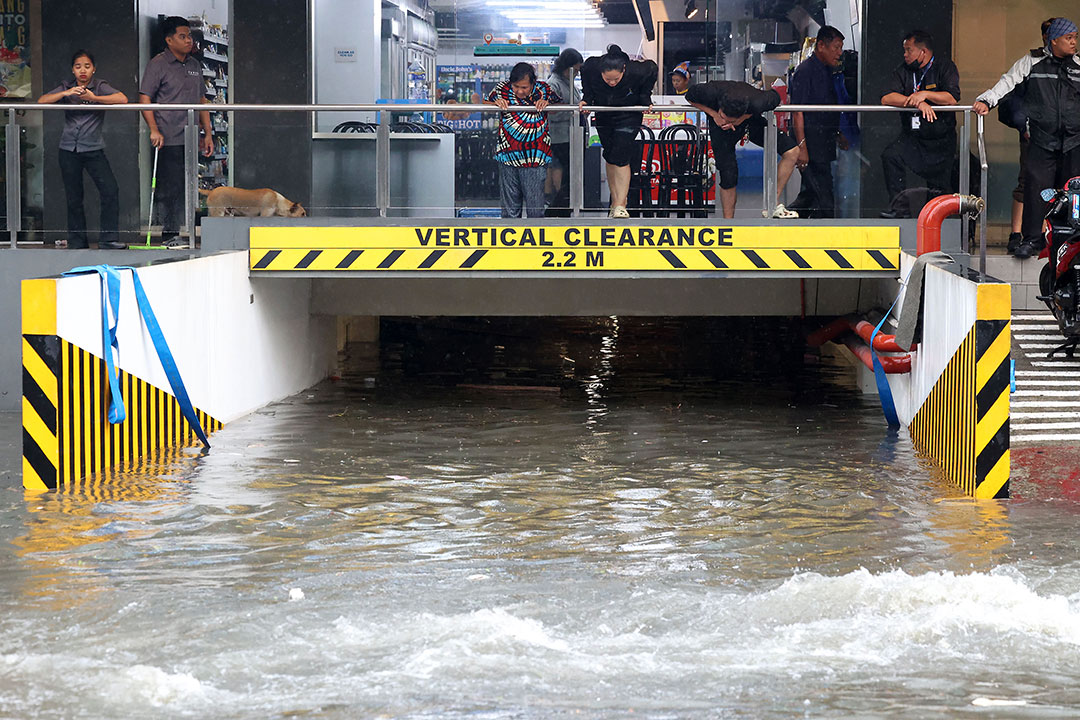
By Aubrey Rose A. Inosante, Reporter
CORRUPTION related to flood control projects have cost the Philippines up to P118.5 billion in economic losses since 2023, Finance Secretary Ralph G. Recto said on Tuesday.
“Due to ‘ghost’ projects, our economy lost between P42.3 billion and P118.5 billion from 2023 to 2025,” Mr. Recto said in his presentation during a Senate Finance Committee hearing.
These estimated average economic losses are based on information from “anecdotal accounts” that put the extent of corruption in the Department of Public Works and Highways’ (DPWH) flood control projects at around 25% to 70% of the total project cost, the presentation showed.
These could have translated to 95,000 to 266,000 jobs for Filipinos, Mr. Recto said.
These allegedly anomalous projects not only drained public funds but also stunted economic growth in the previous years, the Finance chief said.
Philippine gross domestic product (GDP) grew by 5.5% in 2023 and 5.7% in 2024.
“We just learned that the extent of the problem with flood control is this big. Maybe if that money was spent better, we could have grown by 6%,” Mr. Recto told reporters.
“It’s a waste. The economy would have grown at a faster rate. If the money wasn’t wasted, more jobs would have been created.”
He added that the controversy could also dampen investor confidence in the Philippines.
Still, the economy remains on track to meet the government’s 5.5%-6.5% growth target for 2025 despite higher tariffs and adverse weather conditions, Mr. Recto said.
Philippine GDP grew by 5.5% in the second quarter, bringing the first-semester average to 5.4%, a tad below the state’s goal.
The government has launched a widespread probe into alleged anomalies in multibillion-peso flood control programs, which have long been flagged for irregularities as the Philippines faces more weather disturbances.
The DPWH is among the largest recipients of the national budget, securing more than P900 billion this year, a substantial share of which is earmarked for flood control projects nationwide.
President Ferdinand R. Marcos, Jr. earlier said that some P100 billion of the total P545 billion in government funds that were allocated for flood control projects nationwide since 2022 were cornered by just 15 contractors.
Over the weekend, Mr. Marcos appointed former Transportation Secretary Vivencio “Vince” B. Dizon as the new Public Works chief after the resignation of Manuel M. Bonoan.
The President also set up an independent commission to investigate flood control anomalies to further reinforce accountability.
Mr. Recto said the government’s tax collecting agencies are ramping up their probe into the contractors that benefited from these allegedly anomalous projects.
The Bureau of Customs on Tuesday issued a search warrant for the luxury vehicles of the Discayas in Pasig City, but only two out of 12 cars were found during the search.
Among the top 15 flood-control contractors earlier identified by Mr. Marcos were Omega & Alpha Construction and St. Timothy Construction, both reportedly linked to former Pasig mayoral candidate Cezarah Rowena “Sarah” Discaya.
“The Bureau of Customs takes the issue of the missing luxury cars of Discaya with utmost seriousness. We will ensure that these vehicles are located without delay, and if discrepancies are uncovered, all taxes and duties will be collected in full,” Customs Commissioner Ariel F. Nepomuceno said in a statement.
Mr. Nepomuceno has warned that hiding or abetting the concealment of these cars will be punished to the “fullest extent of the law.”
Meanwhile, the Bureau of Internal Revenue has served letters of authority to the tagged contractors.
Analysts have long flagged corruption as one of the biggest risks to Philippine economic growth.
Philippine Institute for Development Studies Senior Research Fellow John Paolo R. Rivera said corruption is not just a governance issue but also a direct economic cost.
“Losses in flood-control projects represent funds that could have gone to infrastructure, jobs, and social services,” Mr. Rivera said in a Viber message.
He described Mr. Recto’s estimate as “realistic,” citing the multiplier effects of efficient public spending.
“The challenge now is to tighten transparency and accountability so that public funds truly translate into inclusive growth,” he added.
Foundation for Economic Freedom President Calixto V. Chikiamco said all kinds of corruption end up as economic losses.
“Corruption exists everywhere, but it hasn’t stopped Vietnam from growing fast,” Mr. Chikiamco said in a Viber message.
Meanwhile, Filomeno S. Sta. Ana III, coordinator of Action for Economic Reforms, called Mr. Recto’s statement “hypocritical” and “deceiving” as fund transfers from state-run agencies — some of which were stopped by the Supreme Court — were approved under his watch.
“Find the link between the infra projects tainted with corruption and the transfer of PhilHealth (Philippine Health Insurance Corp.) and PDIC (Philippine Deposit Insurance Corp.) funds that enabled the funding of these highly questionable projects,” he said in a Viber message.
In 2024, the government initiated the transfer of P89.9 billion from PhilHealth to the National Treasury, labeling these as “excess funds.” The money was supposed to fund various projects, including infrastructure and social services.
The High Court in October issued a temporary restraining order to stop the last tranche of transfers worth P29.9 billion.
Meanwhile, in January, the PDIC remitted excess funds amounting to P107.23 billion to the Treasury.